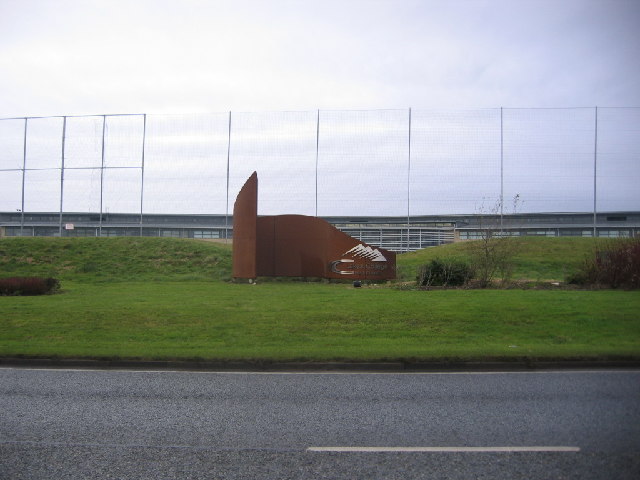|
Energy Coast UTC
Energy Coast is a University Technical College (UTC) on the outskirts of Workington, Cumbria that opened in September 2014 for students of ages 14–19. The "Energy Coast" is the coastal region between Silloth and Barrow-in-Furness, it includes the Sellafield nuclear power site and Nuclear Decommissioning Authority as well as wind farms at Walney Island and Robin Rigg. Description University technical colleges (UTCs) are usually smaller than average-sized schools for 14-to 19-year-olds. They serve Key Stage 4 and Key Stage 5. They focus heavily, but not exclusively, on STEMsubjects. All their technical, academic and practical learning is designed to be applied in the workplace. A UTC’s specialism usually reflects the local economy. Energy Coast UTC specialises in engineering. After an early period of high staff turnover, the staffing is now stable. The principal has been in post since September 2016. In September 2017, the UTC extended it Key Stage 4 provision, by enrolling ... [...More Info...] [...Related Items...] OR: [Wikipedia] [Google] [Baidu] |
University Technical College
A university technical college (UTC) is a type of secondary school in England that is sponsored by a Universities in the United Kingdom, university and has close ties to local business and industry. University technical colleges specialise in subjects like engineering and construction, taught alongside business skills and the use of IT. Pupils study academic subjects as well as practical subjects leading to technical qualifications. The curriculum is designed by the university and employers, who also provide work experience and projects for students. The university and industry partners support the curriculum development of the UTC, can provide professional development opportunities for teachers, and guide suitably qualified students on to industrial apprenticeships or tertiary education. The UTC's governors include representatives from the sponsor university and partner employers. Students traditionally transfer to a UTC at the age of 14, part-way through their secondary educati ... [...More Info...] [...Related Items...] OR: [Wikipedia] [Google] [Baidu] |
Key Stage 5
Key Stage 5 is a label used to describe the two years of education for students aged 16–18 and at sixth form or college. In England, Wales and Northern Ireland, it is aligned with previous Key Stages in the National Curriculum. Key Stage 5 is also the stage of education where students go through more intense and challenging courses in very specific subjects like media studies and physics. This stage is the last stage of secondary education for members of the sixth form. When A levels are achieved, the students will be able to apply for university. See also *Key Stage * Key Stage 1 *Key Stage 2 * Key Stage 3 * Key Stage 4 *GCE Advanced Level The A-level (Advanced Level) is a subject-based qualification conferred as part of the General Certificate of Education, as well as a school leaving qualification offered by the educational bodies in the United Kingdom and the educational a ... School terminology Educational stages Secondary education in England Secondary edu ... [...More Info...] [...Related Items...] OR: [Wikipedia] [Google] [Baidu] |
Educational Institutions Established In 2014
Education is the transmission of knowledge and skills and the development of character traits. Formal education occurs within a structured institutional framework, such as public schools, following a curriculum. Non-formal education also follows a structured approach but occurs outside the formal schooling system, while informal education involves unstructured learning through daily experiences. Formal and non-formal education are categorized into levels, including early childhood education, primary education, secondary education, and tertiary education. Other classifications focus on teaching methods, such as teacher-centered and student-centered education, and on subjects, such as science education, language education, and physical education. Additionally, the term "education" can denote the mental states and qualities of educated individuals and the academic field studying educational phenomena. The precise definition of education is disputed, and there are disagreements ... [...More Info...] [...Related Items...] OR: [Wikipedia] [Google] [Baidu] |
Secondary Schools In Cumberland (unitary Authority)
Secondary may refer to: Science and nature * Secondary emission, of particles ** Secondary electrons, electrons generated as ionization products * The secondary winding, or the electrical or electronic circuit connected to the secondary winding in a transformer * Secondary (chemistry), a term used in organic chemistry to classify various types of compounds * Secondary color, color made from mixing primary colors * Secondary mirror, second mirror element/focusing surface in a reflecting telescope * Secondary craters, often called "secondaries" * Secondary consumer, in ecology * An antiquated name for the Mesozoic in geosciences * Secondary feathers, flight feathers attached to the ulna on the wings of birds Society and culture * Secondary (football), a position in American football and Canadian football * Secondary dominant in music * Secondary education, education which typically takes place after six years of primary education ** Secondary school, the type of school at the sec ... [...More Info...] [...Related Items...] OR: [Wikipedia] [Google] [Baidu] |
University Technical Colleges
A university technical college (UTC) is a type of secondary school in England that is sponsored by a university and has close ties to local business and industry. University technical colleges specialise in subjects like engineering and construction, taught alongside business skills and the use of IT. Pupils study academic subjects as well as practical subjects leading to technical qualifications. The curriculum is designed by the university and employers, who also provide work experience and projects for students. The university and industry partners support the curriculum development of the UTC, can provide professional development opportunities for teachers, and guide suitably qualified students on to industrial apprenticeships or tertiary education. The UTC's governors include representatives from the sponsor university and partner employers. Students traditionally transfer to a UTC at the age of 14, part-way through their secondary education, though many UTCs now accept pupi ... [...More Info...] [...Related Items...] OR: [Wikipedia] [Google] [Baidu] |
STEM Fields
Science, technology, engineering, and mathematics (STEM) is an umbrella term used to group together the distinct but related technical disciplines of science, technology, engineering, and mathematics. The term is typically used in the context of education policy or curriculum choices in schools. It has implications for workforce development, national security concerns (as a shortage of STEM-educated citizens can reduce effectiveness in this area), and immigration policy, with regard to admitting foreign students and tech workers. There is no universal agreement on which disciplines are included in STEM; in particular, whether or not the ''science'' in STEM includes social sciences, such as psychology, sociology, economics, and political science. In the United States, these are typically included by the National Science Foundation (NSF), the Department of Labor's O*Net online database for job seekers, and the Department of Homeland Security. In the United Kingdom, the socia ... [...More Info...] [...Related Items...] OR: [Wikipedia] [Google] [Baidu] |
Compulsory Competitive Tendering
Best Value was government policy in the United Kingdom affecting the provision of public services in England. In Wales, Best Value is known as the Wales Programme for Improvement. A statutory duty of Best Value also applies in Scotland.Audit ScotlandBest Value accessed 29 December 2021 Background The predecessor to the UK Labour Government's Best Value policy was the Conservative Government's 1980s policy of compulsory competitive tendering (CCT). CCT originated in part with the ideas of Conservative politician Nicholas Ridley, who made "unfavorable" comparisons between the "fat and bloated" local authorities of the United Kingdom and the relatively "slim" contract cities of the United States. CCT required public-sector organisations to enable private companies to bid for contracts to deliver certain public services in competition with the public sector's own organisations. The idea was to improve services through competition. The Local Government, Planning and Land Act 1980 ... [...More Info...] [...Related Items...] OR: [Wikipedia] [Google] [Baidu] |
Lakes College (West Cumbria),
Lakes College is a further education institute located at Lillyhall, Cumberland, England, between the towns of Workington and Whitehaven. The college offers courses to students from Allerdale, Copeland and the surrounding areas. These courses include NVQs, BTECs, Diplomas and Access courses, as well as HNCs, HNDs and Foundation Degrees. The college is a sponsor of Energy Coast UTC in Workington. In 2018 the northern hub of the National College for Nuclear was launched at the college, funded by £7.5 million from the Department for Education. The college is expected to service the building and operation of new build nuclear power plants, for example the nearby proposed Moorside Nuclear Power Station Moorside nuclear power station is proposed for a site near Sellafield, in Cumbria, England. The original plan by NuGeneration, a British subsidiary of Toshiba-owned Westinghouse Electric Company, had the station coming online from 2024 with 3.4G .... History Before movi ... [...More Info...] [...Related Items...] OR: [Wikipedia] [Google] [Baidu] |
Gen2
Gen is most commonly seen as a contraction (such as Gen.) and it may refer to: * Book of Genesis * General officer * Generation#Western world as in GenX, GenZ, etc. * Genitive case Gen may also refer to: * ''Gen'' (film), 2006 Turkish horror film directed by Togan Gökbakar * ''Gen_'', a documentary 2025 film * Gen (Street Fighter), a video game character from the ''Street Fighter'' series * Gen Fu, a video game character from the ''Dead or Alive'' series * Gen language, a language of Togo * Gen-san, a character in the anime series ''Sky Girls'' *, a character in the anime and manga series ''Dr. Stone'' *, Japanese Nordic combined skier *, Japanese singer-songwriter, musician, actor, and writer *Gen Kitchen, British politician *, Japanese footballer *, Japanese novelist, visual novel writer and anime screenwriter *, Japanese engineer and businessman *, Japanese politician *, Japanese ballet dancer and choreographer * Gen Digital, a computer security software company in Unite ... [...More Info...] [...Related Items...] OR: [Wikipedia] [Google] [Baidu] |
STEM
Stem or STEM most commonly refers to: * Plant stem, a structural axis of a vascular plant * Stem group * Science, technology, engineering, and mathematics Stem or STEM can also refer to: Language and writing * Word stem, part of a word responsible for its lexical meaning ** Stemming, a process in natural language processing * Stem (music), in music notation, the vertical lines directly connected to the note head * Stem (typography), the main vertical stroke of a letter * Stem, the opening of a multiple choice question Music and audio * Stem (audio), a collection of audio sources mixed together to be dealt with downstream as one unit * Stem (music), a part of a written musical note * Stem mixing and mastering, a method of mixing audio material * The Stems, an Australian garage punk band * "Stem" (DJ Shadow song), 1996 * "Stem" (Ringo Sheena song), 2003 * "Stem", a song by Hayden from the 1995 album '' Everything I Long For'' * "Stem", a song by Static-X from the 19 ... [...More Info...] [...Related Items...] OR: [Wikipedia] [Google] [Baidu] |
Key Stage 4
Key Stage 4 (KS4) is the legal term for the two years of school education which incorporate GCSEs, and other examinations, in maintained schools in England normally known as Year 10 and Year 11, when pupils are aged between 14 and 16 by August 31. (In some schools, KS4 work is started in Year 9.) Legal definition The term is defined in the Education Act 2002 as "the period beginning at the same time as the school year in which the majority of pupils in his class attain the age of fifteen and ending at the same time as the school year in which the majority of pupils in his class cease to be of compulsory school age".Defined in section 82 of thEducation Act 2002/ref> Since that Act, the ending of compulsory education in England has been extended beyond the age of sixteen, but compulsory education beyond the age of 16 is not classed as part of Key Stage 4. England and Wales Purpose The term is used to define the group of pupils who must follow the relevant programmes of study fro ... [...More Info...] [...Related Items...] OR: [Wikipedia] [Google] [Baidu] |



